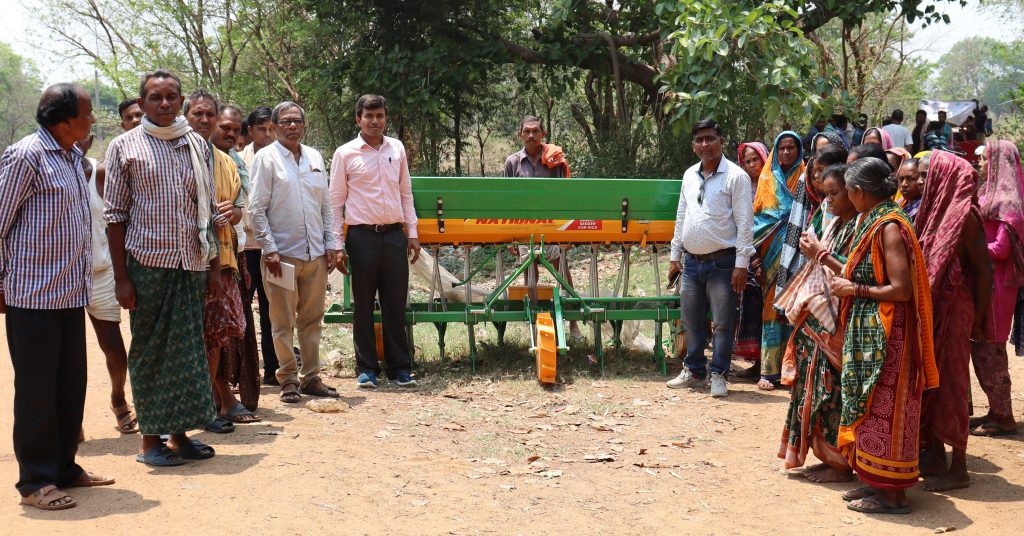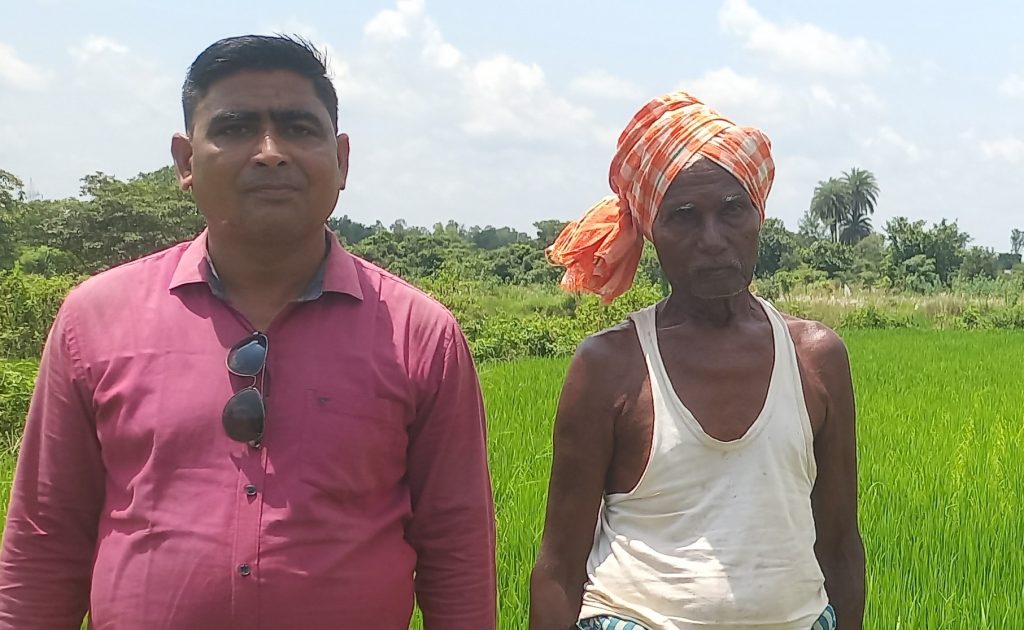Expanding Mechanized/Precision Direct Seeded Rice in Odisha: A Success Story
The IRRI-GoO-DSR-Odisha project titled “Precision Direct-Seeded Rice-based Diversification Systems for Transforming Labour Requirement, Yields and Profitability of Smallholder Farmers in Odisha” aims to expand the practice of DSR to improve and optimize rice production practices in the state.
Under this project, the IRRI-CSISA team works closely with smallholders of Odisha in select districts with a system approach to achieve broader objectives of improving farm income, food security, and environmental sustainability.

A success story
A given technology may be already proven successful in farmers’ fields in a specific geography, But when a different landscape is targeted for its introduction, technology revalidation becomes the first step to proceed. Farmers’ acceptance of the technology is the second step to follow and can be achieved through technology demonstrations – ‘believing by seeing.’ For demonstrations and then adoption if the technology is found suitable to the ecology, appropriate platforms and scaling strategies play a crucial role in popularising the technology with sustainability.
In Odisha, the CSISA team this year, through proper identification, strategic collaboration, continuous engagement, and communications with the right stakeholders, made the project implementation smoother, efficient, and effective. These efforts are also helping in motivating and engaging the rural youths in agriculture and promoting resource-conserving technologies. Such collaborative efforts with the project partners and appropriate policy intervention will help in scaling the mechanized DSR in the wet season and pulses and oilseeds in the dry season in the state.
Agranee Jana Kalyan Anusthanan NGO encourages farmers to adopt best practices in DSR
Mr. Santanu Dash, aged 42, the coordinator of a local NGO, Agranee Jana Kalyan Anusthan (AJKA), in Bargarh, first met with the DSR-Odisha/CSISA project team on 9th April at a field day program on mechanically sown rabi 2021-22 season crops.
Though the NGO was associated with other IRRI projects earlier but for the first time, they attended and visualized mechanized sown crops in the field day program. Dash and his team got trained on the technology of mechanized establishment of crops with tailored agronomy. The project team received an encouraging response from the NGO for executing collaborative activities in the Kharif season of 2022 among the contact farmers, including a large group of women farmers associated with Self Help Groups (SHGs).

Dash was also engaged in a traveling seminar organized by IRRI-CSISA on mechanical sown rabi season crops layered with improved varieties and agronomy in Puri on 20th April. The mechanically sown improved varieties of pulses with profuse pod setting in the standing crop increased his interest in the technology. He interacted with the local farmers in Puri in the presence of the project scientists and gained information on the successful execution of the technology. In the interactive session during the seminar, he expressed his intentions that his team would try to motivate and train the farmers in the coming Kharif season to adopt the mechanized DSR with BMPs. He was hopeful that “farmers from other districts in Odisha may come to see their fields just like the ongoing traveling seminar.”
On 19th May, to support Dash’s resolve to popularise the technology, a two-member team from the NGO, including Dash, was trained through a hands-on training program on mechanized direct seeded rice along with the identified service providers at Bhatli block in Bargarh district under DSR-Odisha and CSISA projects. The participants got trained on field calibration of the multi-crop seed drill and sowing of mechanized direct seeded rice at a conventionally tilled field in the program. Further, to enhance his capacity for motivating others, Dash was nominated to participate in a three-day Training of Trainers (ToT) program in June at the IRRI South Asia Regional Centre (ISARC), Varanasi. The program aimed at creating master trainers on precision-DSR-based systems. Expressing confidence with the in-depth theory and practical training at ISARC, he said his team is motivated to improve awareness around precision DSR and the associated technologies in their own and adjoining districts.
Soon after, as expected, Dash and his AJKA NGO team started creating demand aggregation of the technology well in advance of the Kharif season of 2022. Through small group meetings, personal talks, and photographs of the DSR technology, the team encouraged a group of farmers, including women SHGs associated with them, in the Bhatli and Bargarh blocks of the districts. Around 100 farmers learned about the technology through these initiatives and gatherings. Dash and his team also executed about 50 acres of mechanized DSR demonstrations with medium and long-duration hybrids covering 20 farmers during the Kharif season of 2022. The project team based in Bargarh provided technical support for these demonstrations. These well-established DSR demonstration fields are maintained by best management practices, including integrated weed management practices by the team.
The AJKA NGO also targeted another 100 acres of precision DSR, including dry-DSR (drill-sown), precision-broadcast DSR, and wet-DSR (drum seeder sown) in the current Kharif season in the district. Dash expressed that farmers now show interest in the technology after seeing such uniform crop establishment through mechanized DSR. Dash and his team are confident that in the next Kharif season, they will cover more than 2000 acres of precision-DSR in the district.
